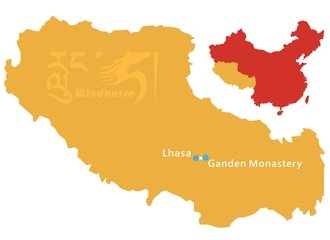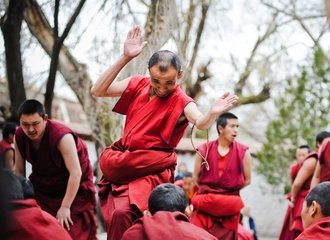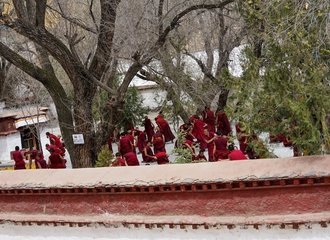Etiquettes and taboos
With unique culture and religion, Tibetans have different ways of behavior in many aspects. The following is about some of Etiquettes and Taboos in Tibetan.
- Presenting Hada (or Khatag) is traditional practice of respect and hospitality in Tibet, and will be appreciated by your host. If you are presenting a Hada to a statue or a high lama, raise the Hada above your shoulder and bow. When you receive a Hada, it is proper to accept with both your hands.
- Remember not to step on threshold when entering the tent or house.
- Calling somebody in name please add 'la' behind the name to express respects.
- If you are asked to sit down, please cross your legs, do not stretch your legs forward and face your sole to others.
- You should accept the gift with both hands. While presenting the gift you should bend your body forward and hold the gift higher than your head with both hands. While offering tea, wine or cigarette, you should offer them by both hands and any fingers do not touch inside of the bowl.
- Do not touch, walk over or sit on any religious texts, objects or prayer flags in monasteries.
- When the host presents you a cup of wine, you should dip your ring finger in the wine and flick the wine into the sky, in the air and to the ground respectively to express your respects to the heaven, the earth and the ancestors before sipping the wine. The host will fill the cup, and you take a sip of the wine again. After the host fills your cup again, you have to bottom it up.
- Tibetan people do not eat horse, dog and donkey meat and also do not eat fish in some areas, so please respect their diet habits.
- It is not polite to clap your palms and spit behind the Tibetan people.
- Tibetan people stretch out their tongue to say hello to you. Also it is a courtesy to put their hands palm in front of breast.
- Do not smoke in monasteries. Also it is banned to touch the statue of Buddha and religious articles and take pictures of them. In addition, all should walk clockwise (not in the Bon temples).
- Seeing any dagobas, monasteries or Mani piles, please go around them clockwise (not of the Bon), do not cross them.
- Eagles are the sacred birds in the eyes of the Tibetan people. You should not drive them away or injure them. On the outskirts, you could not drive or disturb the sheep or cows with red, green or yellow cloth strips on.
- Don't wear shorts, especially go to visit monasteries, temples.
Since more and more tourists are going to Tibet, more and more Tibetan people get used of seeing the 'Big Noses' (western people) with jeans, sun glasses and some of them with shorts. The above rules are not obeyed so strictly as before. But we still suggest you take the above advices and travel to behave well.














